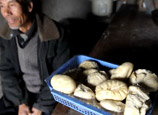
The third source of underestimation has to do with household survey methods which rely on randomly sampled households to record monthly incomes and expenditures. These households are paid only a small nominal compensation for participating. Aggregate household consumption expenditures are calculated by multiplying the average consumption expenditure per capita across the entire population. Several problems arise when doing this though. For one thing, high income households are known to be under-represented because they have no incentives to report their incomes or bother with keeping expenditure records. This would underestimate average consumption per person. Moreover, households may easily miss recording some expenditures, especially small ones, as there are no explicit incentives for them to keep an accurate record. Also, in-kind consumption may be underestimated either because people fail to record it or assign it a low value.
Lastly,?local currency-based national account statistics are not ideal for cross-country comparisons. Academics often use what is called the Penn World Table (or Summers-Heston Dataset) instead. The Penn World Table (PWT) was developed by the International Comparison of Prices Program at the University of Pennsylvania. It differs from the official national account statistics in that it makes purchasing power parity adjustments to consumption and investment price levels as well as official (or market) exchange rates. According to the just-released version of the PWT, and without including the missing consumption expenditures we just mentioned above, China's consumption ratio stood at 60.9 percent of GDP in 2010, the latest year the table covers, not the official figure of 47.4 percent.
China's consumption rate is generally comparable to levels of consumption in the East Asian tiger economies based on figures from the PWT. For example, South Korea's consumption has been around 60 percent of GDP since the mid-1980s and Singapore's consumption has hovered at an average of 45 percent over the past 20 years. All of the tigers have gone on to become high-income developed economies. China seems firmly on its way to eventually joining the club.?
The authors are Zhang Jun, director of China Center for Economic Studies at Fudan University, and Zhu Tian, professor of Economics from China Europe International Business School. bizopinion@globaltimes.com.cn
 |
















 Beijing fantasy emerges in dense fog
Beijing fantasy emerges in dense fog


![]()
